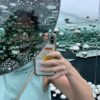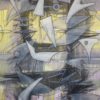New York, NY, December 10, 2015 – Albertz Benda is pleased to present like·ness, a group exhibition featuring works by seven contemporary artists – Del Kathryn Barton, Sara-Vide Ericson, Dongwook Lee, Kalup Linzy, Nathaniel Mary Quinn, Terry Rodgers, and Dennis Scholl – that focus on physical egocentricity in the digital age. Through a variety of mediums including film, painting and sculpture, like·ness offers an aesthetic overview of social pressures, the human body and the correlation between vanity, insecurity, and self-obsession.
Serving as an introduction to the exhibition is Rodrigo Prieto’s 2013 short film “Likeness”. A directorial debut for the Oscar-nominated cinematographer, the film is a personal meditation on eating disorders based on his daughter’s experiences. Elle Fanning stars as a young girl who struggles with a splintered self-perception highlighted by society’s expectations and idealizations of the female form.
Exhibition highlights include: two ornate, figurative paintings by Australian artist Del Kathryn Barton; three large-scale, realist paintings by Terry Rodgers portraying gaunt and privileged youth; conceptual portraits by Swedish artist Sara-Vide Ericson; a mixed-media fragmented figure by Brooklyn-based artist Nathaniel Mary Quinn; five small-scale sculptural works depicting contorted human forms by Korean artist Dongwook Lee; and one large-scale surrealist drawing by German artist Dennis Scholl; among others.
Culled from around the globe, the artists in this exhibition utilize character studies as a means of exploring the increasingly complex concept of identity. When viewed from this vantage, the works serve as a statement on the proliferation of social media platforms and the obligation to establish a curated identity. Rather than reinforcing a sense of self, these post-information age “portraits” are a combination of how we want to be seen, how we view ourselves, and the way others perceive us. like·ness emphasizes this disjunction from reality and provides insight into the societal and political aspects that affect everyday life.
For the full press release, please click here.
Del Kathryn Barton (Australian, b. 1972) employs friends and family as the subjects of her vibrant portraits, exploring how these relationships have transformed her understanding of herself. Combining traditional painting techniques with contemporary design and illustrative styles, Barton’s paintings are simultaneously unnerving in their otherworldly depictions of the figure and charming in their intense ornamentation. like·ness will also serve as the New York debut of her film, “The Nightingale and the Rose.” Adapted from Oscar Wilde’s classic fairytale, Barton’s “The Nightingale and the Rose” speaks to the perils of losing a sense of self in the quest for external validation.
Sara-Vide Ericson (Swedish, b. 1983) deftly navigates the fine line between embracing one’s most visceral emotions and being consumed by them. Using the natural world to frame her brooding subjects, Ericson offers the seclusion of rural life as an alternative to the pressures of society. Describing her childhood spent on a remote farm, Ericson recalls how “the landscape would turn into an emotional backdrop… in the middle of nowhere, scared, angry or hurt, and you’re out there until you’re healed.” Existing on the rugged fringes of civilization, the figures in her boldly colored paintings are at once vulnerable and forceful in their independence.
Dongwook Lee (Korean, b. 1976) shrinks and twists the human form, sculpting hyper-realistic figures that are darkly humorous reflections on the absurdity of contemporary preoccupations with material objects and comforts. Eradicating the opposition between the mundane and the grotesque, Lee disrupts the stupor of reality through his fantastically rendered sculptures.
Kalup Linzy (American, b. 1977) writes, directs, produces, and stars in video works that challenge conventional notions about sexuality, race, and gender. Linzy’s pieces invoke a satirical narrative inspired by soap operas and Hollywood melodramas, highlighting the artifice of popular media while drawing us into the stories. Often playing multiple roles within the films, Linzy demonstrates that identity is fluid and often contradictory.
Nathaniel Mary Quinn (American, b. 1977) examines the complex construction of identity, inevitably influenced by past memories and present experiences, through his paintings. The works are comprised of highly textured, painstakingly rendered assemblages of limbs and facial features. The artist’s personal history has had a tremendous influence on his work. Having grown up in an impoverished neighborhood Chicago, Quinn explains, “I hope to convey a sense of how our experiences, both good and bad, operate to construct our identities. I also want to portray a mutual relationship between the acceptable and the unacceptable, the grotesque and what is aesthetically pleasing.”
Terry Rodgers’s (American, b. 1947) visually complex, hyper-realistic paintings address themes of longing and loneliness in terms of contemporary body politics. His monumental figurative canvases emphasize the detachment of his characters – despite their glamorous surroundings and “enviable” looks, they seem burdened by their own bourgeois ennui.
Dennis Scholl’s (German, b. 1980) feverish, meticulous drawings delve into the subconscious and the surreal. The obsessive execution of the work contributes to a sense of emotional vertigo. Scholl’s drawing, Peeping Tom, is simultaneously beautiful and grotesque; flora, fauna, and human features collapse into each other in an endless cycle of growth and decay. Each of his drawings is a slow construction of a parallel world. The objects portrayed refer to people and stories, yet the narrative is dictated by absences and inconsistencies evolving from the Lacanian concept of “manque,” or ‘lack,’ and reflecting the porous identity of the protagonists.
About Albertz Benda
Opened in Fall 2015, Albertz Benda is a new gallery partnership between Thorsten Albertz and Marc Benda committed to presenting and nurturing a contemporary visual arts program, featuring a distinct roster of emerging and established artists.




















Comentarios